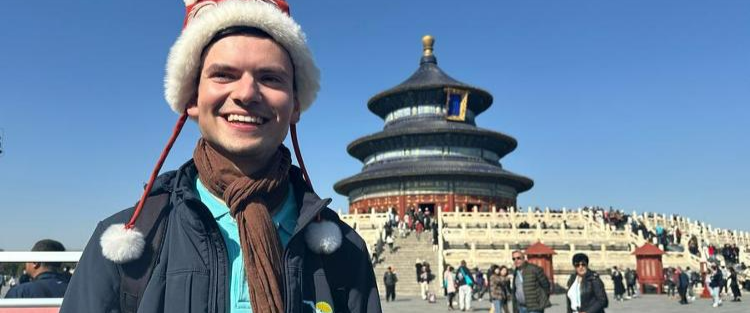China’s Foreign Tourism Soars, While Lacks Foreign Language Guides

This is the eighth year for Sichuan native Pablo in the tourism industry, and he suddenly feels like he is riding on the crest of a wave.
When he entered the industry in 2016, there were only four Spanish-speaking tour guides in Chengdu, including him. In addition to serving as a local guide and receiving inbound tourists, Pablo often led domestic outbound tour groups to Spain. With the downturn in the tourism industry over the past three years, he switched to working as a translator for a construction company with operations in South America. In early last year, he returned to the tour guide profession and became the only full-time Spanish-speaking tour guide in Chengdu.
Over the past year, he witnessed the gradual recovery of inbound tourism, followed by explosive growth starting in March this year. A series of macro policies drive such growth:
Since early last year, the National Immigration Administration has gradually restored the 72/144-hour transit visa-free policy for 54 countries. On November 17, the Department of Consular Affairs of the Ministry of Foreign Affairs issued an announcement simplifying visa procedures for foreigners coming to China. Seven days later, the Consular Department issued another announcement stating that citizens of France, Germany, Italy, and six other countries holding ordinary passports could enter China visa-free for up to 15 days between December 1, 2023, and November 30, 2024. On March 8, 2024, these visa-free countries were expanded to include six additional countries, including Switzerland. On May 8, China decided to extend the visa-free policy until December 31, 2025. With the support of these policies, numerous Western tourists have been attracted to visit.
Pablo also experienced the explosive growth of foreign tourists. As the only Spanish-speaking tour guide currently in Chengdu, his schedule from March to the end of October was fully booked: at least 25 days of guiding tours each month, from 8 am to 4 pm every day.
Despite arranging a demanding schedule for himself, many foreign tour groups still cannot find a guide. To address this, he collaborates with travel agencies and utilizes spare time to train third-year students majoring in Spanish at Sichuan foreign language colleges, thereby increasing the number of Spanish-speaking tour guides.
He can’t help but reflect on the ups and downs of fate: “Last year, I was desperately seeking tour groups to guide, and this year, I can’t find any guides at all.”
For many foreign tourists, Chengdu, Sichuan is a place full of surprises, which is somewhat related to their “stereotypical impressions” of the city. Pablo remarked that although many young people learn about Chengdu’s tourist attractions and culture through overseas video platforms like TikTok and YouTube before coming here, many older tourists still think of Chengdu as a small county with only pandas.
According to Pablo, the popularity of tourism in Chengdu is closely related to the Chengdu-Xichang high-speed railway. The
Terracotta Army in Xi’an has greater international fame, and many tourists first go to Xi’an and then take a three-hour high-speed train to Chengdu. As a result, “Some people, as soon as they arrive at the train station, exclaim, ‘Wow, why is this train station so big?’ and then ask me how many people actually live in Chengdu.”
Although there is a 15-day visa-free policy and a 144-hour transit visa, the majority of Pablo’s clients still prefer to apply for a travel visa that allows them to stay for 30 days, taking advantage of the simplified procedures. Some clients admit that since Spain and Central and South America are far from China, after enduring a long flight of over ten hours, they prefer to stay a few more days and visit more places.
Elisabeth Villiger-Toufex, a 63-year-old woman from Switzerland, can be considered a speedy tourist. In just eight days, she traveled to Beijing, Shanghai, and Suzhou, three cities in rapid succession.
This is Elisabeth’s second visit to China. As a former tour guide, she has been to over a hundred countries. Over thirty years ago, she led a group of tourists from various European and American countries on a classic itinerary that covered Beijing, Shanghai, Xi’an, Guilin, and Hong Kong. In Elisabeth’s memory, China at that time was almost devoid of skyscrapers, and even the streets of first-tier cities had a fair amount of litter. Pedestrians they encountered were curious about the foreign tourists but didn’t approach them; they just stood on the side murmuring and observing.
This time, Elisabeth came to China for a family reunion. She currently resides in Cyprus, her son came to Nankai University for a year-long Chinese language program in August of last year, and her daughter is studying in Switzerland. The three of them hadn’t seen each other for over six months. What made her laugh and cry was that right after she obtained her travel visa, China announced a 15-day visa exemption for Switzerland. Before her departure, Elisabeth packed her bags and, prompted by her son, downloaded Alipay and Didi Chuxing. She quickly mastered these “new technologies” on her phone, and the whole process went smoothly.
The smooth experience is thanks to China’s optimization of mobile payment methods over the past year. Previously, using mobile payment platforms like Alipay required linking to a domestic bank account, which deterred many foreign tourists who wanted to travel to China. To improve this situation, during the Hangzhou Asian Games in July last year, Alipay and WeChat Pay both enabled support for binding with overseas bank cards such as Visa and Mastercard. On March 15 of this year, the People’s Bank of China released the Payment Guide for Foreigners in China, which vividly illustrated the processes for using five payment services. On March 18, Alipay launched its Multilingual Translation Service, expanding from the original Chinese-English languages to 16 languages. The translation service can be used in-app for scenarios such as hailing a taxi, booking hotels, and reserving tickets. This made it more convenient for Elisabeth, a native German speaker, to pay her bills.
On the first day of her trip to Beijing, Elisabeth met her one-day tour guide at the Temple of Heaven and embarked on her speedy tourism. Elisabeth’s daughter booked this itinerary through the travel website Trip. Trip was acquired by Ctrip in 2017 and is a bona fide Chinese company with a wide range of international users. At the Temple of Heaven, Elisabeth experienced the blending of the past and the present. The place hadn’t changed much from thirty years ago, but “everything became clean and well-organized,” and the Chinese people had become “more open and welcoming,” Elisabeth said.
Several groups of Chinese tourists approached Elisabeth, greeted her, and asked where she was from. Some politely asked to take pictures with her, and Elisabeth gladly agreed, saying, “I feel like a star!”
Elisabeth’s second stop in Beijing was Nanluoguxiang. Last time she visited, it was purely a residential area, but now it has a stronger commercial and cultural atmosphere. In a video taken by Elisabeth, she excitedly posed in front of a picturesque and ancient wishing pool surrounded by mist. She also took a close-up shot of a string of wish cards next to her, one of which had the most down-to-earth wish of most Chinese people: “Become rich instantly, win a 100 million lottery jackpot.”

With the end of the COVID-19 pandemic and the promotion of visa-free policies, more and more foreign tourists like Elisabeth are choosing China as their next travel destination.
According to data released by the National Immigration Administration on April 18, China issued a total of 466,000 visas to foreign nationals in the first quarter of this year, an increase of 118.8% compared to the same period last year. The number of foreign nationals entering China visa-free reached 1.988 million, a year-on-year increase of 266.1%. The number of foreigners visiting China has more than tripled compared to the same period in 2023, with over 30% of them being tourists.
According to a public notice issued on May 6, during the May Day holiday, the number of foreigners entering and leaving China reached 779,000, an increase of 98.7% compared to the same period last year.
On May 15, the National Immigration Administration announced that foreign tourist groups traveling to China by cruise ships would be eligible for visa-free entry starting from that day.
Pablo believes that many cities, including Chengdu, are making efforts to better receive foreign tourists. He noticed that under the guidance of the Sichuan Foreign Affairs Office, many businesses in popular attractions such as Kuanzhai Alley and People’s Park have prepared cash, activated card payment options for Visa and Mastercard, and some businesses have displayed the Payment Guide for Foreigners in China at their counters.
In the past, purchasing tickets for scenic spots was a challenge for foreign tourists because they didn’t have a Chinese ID card and had to queue offline to buy tickets. Before and after the Spring Festival this year, some scenic spots specifically opened online ticket purchasing options for passports, saving foreign tourists the time of queuing.
In early April, Pablo took a group of Spanish tourists to see the Leshan Giant Buddha, stopping by to eat bowl Chicken, and was pleasantly surprised to find that the restaurant had introduced an English menu.

Elisabeth demonstrated a cosmopolitan attitude towards her trip to China, saying, “Humanity is universal, we are all the same. No matter where we come from, we all seek safety and happiness.”
At the end of April, Elisabeth’s tour came to an end. While waiting for her flight back home, she ordered a glass of champagne in the VIP lounge at Pudong Airport. Just as she picked up her glass, ready to enjoy a sip, she suddenly noticed a sign on the table that read, “Please drink in moderation.”

This kind of notice made Elisabeth burst into laughter. “Did people really get drunk at the airport before?” she wondered. Despite having visited over 100 countries, this gentle reminder, like advice from a dear friend, was the first time she had seen it.
She swirled her glass and began planning her next trip to China in her mind.
https://news.ifeng.com/c/8Zk6zqjfUsw




